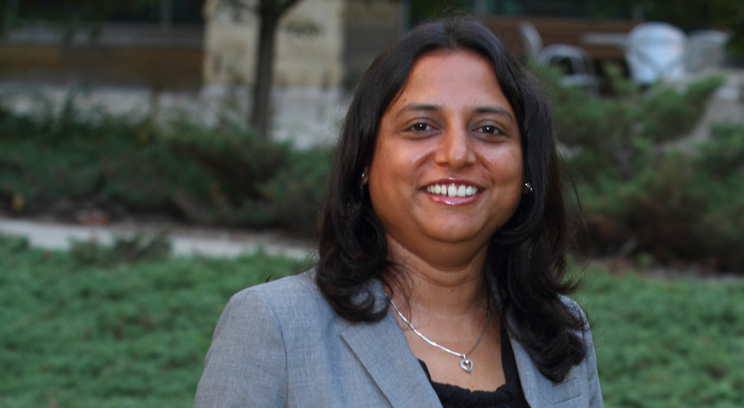For Rashmi Kandwal, first-year Full-time UST MBA student, the classroom is not an unfamiliar place. Prior to joining the full-time MBA program, Kandwal spent many years in the graduate school environment studying and conducting research while earning her Ph.D. in health geographic information systems, focusing on HIV/AIDS in India. Her decision to pursue an MBA, specifically one at UST, arose out of her search for health sector jobs in the Twin Cities–Kandwal realized that in addition to requiring a deep knowledge of the global health industry, many of the jobs at her target companies were marketing or management related, and she needed to supplement her advanced healthcare education with business knowledge.
Enter the Full-time MBA program at UST. UST became Kandwal’s graduate business school of choice primarily based on the program structure and student experience. It was important to her, especially given her background, to be able to develop and leverage strong relationships with faculty members, and a close-knit student community to deepen learning and skill building in areas of business that were entirely new to her.
At about the half-way point of her Full-time MBA experience, one of Kandwal’s biggest insights has been the ability to integrate concepts across different business domains to solve problems. The Full-time UST MBA curriculum fosters this skill-building through an integrated curriculum, where core faculty members plan their respective course material to complement, challenge, and/or build upon what students are learning in the other classes they are taking each semester. Kandwal credits this approach with being able to more confidently communicate in the business language and understand the impact of a decision in one functional area on another.
The integrated approach to learning in the Full-time MBA program also includes embedded professional development opportunities, including Career Services workshops focused on building skills for success in today’s market, such as networking. For Kandwal, the ability to prepare and practice networking skills aided by Career Services, in addition to having access to a personal career coach, were integral in obtaining a summer internship at Ecolab.
Kandwal’s internship will be focused on business intelligence in the health care sector, analyzing sales by geographic region. For Kandwal, this role is one that leverages her previous experience from Ph.D. research, while also using the critical thinking and analytical skills she has developed through the integrated curriculum in the Full-time MBA program. With an overarching career goal to work in a global health systems related role, Kandwal’s internship experience and student experience will blend ideally to advance her career aspirations.
If Kandwal sounds busy with learning and networking, she is – but she has still managed to be involved in valuable extra-curricular activities during her first year in the Full-time MBA program, a standout example being the Hult Prize competition. Kandwal’s team was one of 350 selected from 10,000 worldwide submissions to present their business plan at one of six regional competitions. UST’s team traveled to Boston in early March and presented with 50 other teams to a panel of judges, where one team was selected to move onto the final competition. Although Kandwal’s team was not selected to move on to the final round of only six teams, she gained significant experience and insights through her experience, and drew upon her skills and knowledge gained thus far in the Full-time MBA Program.
Kandwal first and foremost valued the experience of working with a diverse team of second year MBA students – through their unique perspectives, professional backgrounds, and representation of different cultures, the UST Hult Prize team developed a thoughtful and well-received presentation as cited by the competition judges. Kandwal noted that the integrated nature of the UST MBA curriculum provided ‘building blocks’ for the team to approach and understand the extent of the Hult Prize ‘problem’, conduct research, refine their approach, and present a comprehensive solution. Kandwal also noted that the support of the UST community and feedback from faculty members about their written and verbal presentation was key in assisting her team to reach their full potential, and that she plans to compete in the Hult Prize again next year.
With all that Kandwal has accomplished to work toward her academic and professional goals in her first-year of the Full-time MBA Program, one would think a momentary break would be welcome. She, on the other hand, is instead already looking ahead—to her internship at Ecolab, and beyond, to her second year MBA experience. She is excited about focusing on electives, while also taking advantage of more applied and integrated learning opportunities such as the Mayo Innovation Scholars program. To Kandwal, these opportunities represent ways to continually evolve as a business professional. With vast prospects ahead of her, Kandwal’s summation of her student experience to-date is surprisingly simple: “I’m very happy.”







